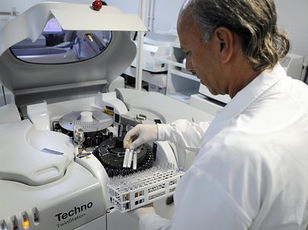 = Top 5% Rated Quiz,
= Top 5% Rated Quiz,
 Top 10% Rated Quiz,
Top 10% Rated Quiz,
 Top 20% Rated Quiz,
Top 20% Rated Quiz,
 A Well Rated Quiz
A Well Rated Quiz
 =
added recently,
=
added recently,  = Editor's Pick
= Editor's Pick
 = FunTrivia Editor
= FunTrivia Editor  = Gold Member
Teachers / educators
= Gold Member
Teachers / educators: FunTrivia welcomes the use of our website and quizzes in the classroom as a teaching aid or for preparing and testing students. See our
education section. Our quizzes are printable and may be used as question sheets by k-12 teachers, parents, and home schoolers.
· All questions, answers, and quiz content on this website is copyright FunTrivia, Inc and may not be reproduced without permission. Any images from TV shows and movies are copyright their studios, and are being used under "fair use" for commentary and education.
 Blood tests and other medical science tests are a fundamental and integral part of the diagnosis of disease. In a hospital, the amount and speed with which these tests are performed and reported are vital. Here are ten such important tests.
Blood tests and other medical science tests are a fundamental and integral part of the diagnosis of disease. In a hospital, the amount and speed with which these tests are performed and reported are vital. Here are ten such important tests. 





 Quick Question
Quick Question